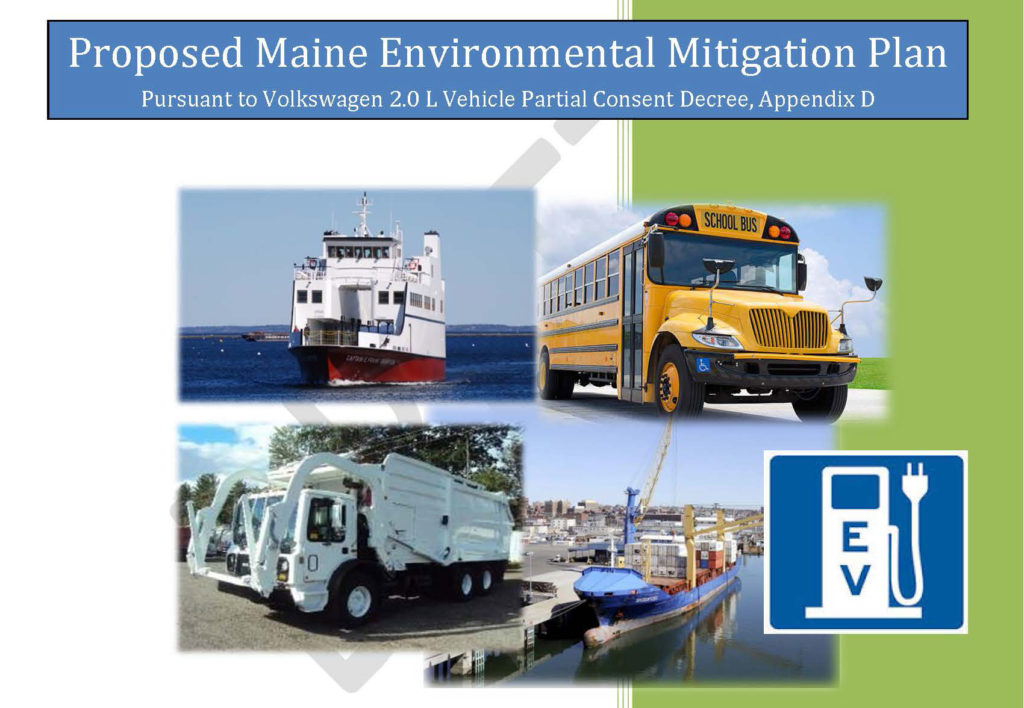Maine’s share of the recent settlement with Volkswagen for emissions violations is about $21 million. While the funds come with numerous restrictions, the Maine Department of Transportation (DOT) recently found itself asking just this question as staff worked with the Department of Environmental Protection’s Bureau of Air Quality to put together a draft plan for how to spend the money. If you want to weigh in on the plan, MaineDOT is currently accepting comments, and the deadline for submitting comments is January 15th.
In 2015, the Environmental Protection Agency (EPA) alleged that various Volkswagen vehicles had software installed on them that allowed them to circumvent EPA emissions standards. Volkswagen entered into a settlement for these Clean Air Act violations in 2016 and the state funding needed to mitigate the environmental and public health impacts of the excess nitrous oxide (NOx) emissions.
Since these funds are meant to compensate Maine for environmental damage caused by excess NOx and other diesel emissions, the primary purpose of the funds is to reduce pollution from diesel engines. MEDOT’s draft plan proposes dividing the funding as follows:
- $8.4 million to MEDOT priorities for multimodal transportation improvements;
- $5.3 million to public, quasi-public, and private vehicle fleets with larger diesel engines;
- $4.2 million to Diesel Emissions Reduction Act programs (DERA); and
- $3.2 million to Zero Emissions Electric Vehicle Service Equipment.
This is a lot of money for a small state like Maine, and there is a significant opportunity for these funds to help shape the future of our transportation sector. From the Island Institute’s perspective, this plan provides two distinct opportunities to help our island and coastal economies.
The inclusion of the DERA program as a planned use for funding stands to provide a significant economic benefit to Maine’s island and coastal communities, since a good portion of these funds will likely be used to help cover the cost of repowering commercial vessels. Maine’s Clean Diesel Program has repowered over 100 fishing vessels, ferry boats, and other commercial vessels operating off our coast. An additional $4.2 million in this program will help many more vessel owners repower and provide good work for Maine’s boat yards. Maine Marine Trades Association (MMTA) helps the Maine Department of Environmental Protection (DEP) administer the marine portion of this program, and MMTA is working to make sure its members understand how the program works and which vessels might be eligible.
The plan allocates the maximum funding allowed under the settlement for supporting electric vehicle (EV) infrastructure, and it is likely that these funds will be used to encourage EV tourism. From a long-term transportation and energy use perspective, this could be a transformative investment. The Route 201 Corridor is a high priority for the Governor, and hopefully some of these funds will be used to draw tourists into other parts of the state. Looking into the future, there may be opportunities for island communities to continue to be leaders in addressing transportation-related energy challenges.
Some of the other eligible uses for these funds include shore power for ocean-going vessels like cruise ships, so they don’t have to run generators when they are in port, as well as forklift and port cargo handling equipment.
For more information on the original suit against Volkwagen as well as the details of the settlement, see “United States v. Volkswagen” (The Atlantic, 1/4/16) and “Volkswagen Clean Air Act Civil Settlement” (EPA.gov). In addition, here is a link to a short flyer about the plan as well as additional information on the MaineDOT website.
MaineDOT will hold two public meetings on the draft Maine Beneficiary Mitigation Plan prior to its becoming final. Public comments on the draft plan and/or the process for distributing funds may be submitted at http://maine.gov/mdot/vw/comment/. The deadline for comments is January 15, 2018.
Editor’s note: This is the first in a series in which Island Institute staff share information that comes from our policy work. Institute staff members often attend meetings, hearings, and other events where changes to government programs, policy, and funding are discussed. To better serve our constituents and readers, we will share information relevant to island and coastal communities. To learn more about our policy work, contact the Island Institute’s policy officer, Nick Battista at nbattista@islandinstitute.org.


